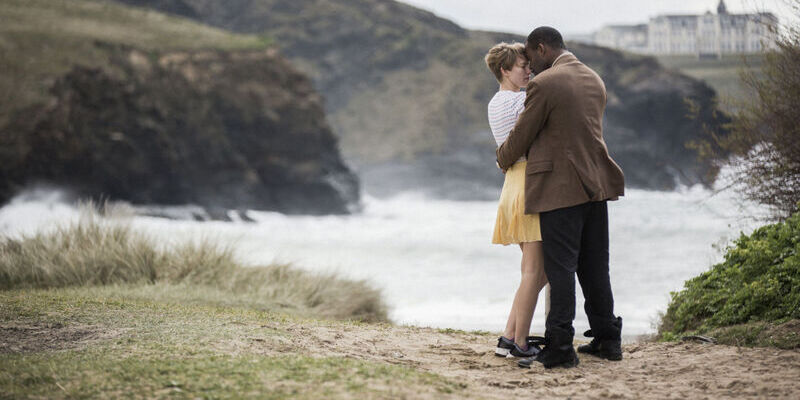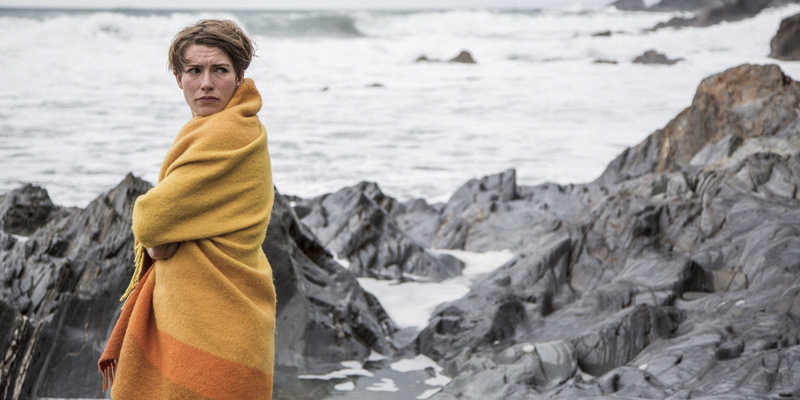
Review by
Ren Zelen
Directed by: Justin John Doherty
Starring: Katharine Davenport, James Barnes, Sebastian Badarau,
Bean Downes

Wilderness, a feature film written by Neil Fox and directed by his long-time
collaborator Justin John Doherty, concerns two people, John (James Barnes) and Alice (Katherine Davenport), caught up in a fevered physical love affair. However, John is a
touring jazz musician and their affair has consisted mainly of moments
snatched between tours and after late-night gigs. It appears that, despite
their fervent declarations of love and devotion, these two people don’t
know each other very well.
One weekend they take the opportunity to hire a remote cottage and spend
some quality time together. It turns out not to be the romantic getaway they
expected, as secrets begin to surface and tensions arise, threatening their
relationship. The fragility of their bubble of infatuation is exposed, as
they discover the failings, flaws, vulnerabilities and manipulations that
have so far eluded them in their mutually idealised passion.

On a drunken evening with John’s old friends, Alice dances provocatively
with Charlie (Sebastian Badarau) and berates men with his wife
Francis (Bean Downes) for ‘keeping secrets’ when she stumbles upon
the revelation of a past affair, although she herself offers no insight into
her own past life.
John declares that he has never met a woman like Alice, and characters in
the film agree that Alice is ‘quite something’. Maybe so, but I could not
fathom quite what. Her emotions and moods seem to turn on a dime, leaving
John, unsurprisingly, in a permanent state of self-doubt and
insecurity.
Interestingly enough, despite being female, I found that I personally
empathised with John, as like him I rarely understood where Alice was coming
from or where her emotions might lead her. She appears undeniably sexual,
warm and loving, but also critical and manipulative when challenged.
She declares that she knew herself well, while criticising John’s lack of
self-knowledge, but her explanations of her own actions seem to do more to
obfuscate her connection to the relationship than clarify it.

The shadow of indie film pioneer John Cassavetes hangs heavily over the
film, as it presents problematic characters whose inner lives and desires
are not easily understood. Some scenes are largely improvised and it is not
a requirement for the viewer to empathise with the characters as they unpick
their emotional responses and connections.
My own mystification regarding John’s infatuation with this woman only
increased as the movie progressed. Certainly, as Alice repeatedly implied,
John had a tendency to introspection and self-flagellation, and I suspected
there was some masochistic need in his attachment to her. Often, rather than
comfort him, Alice’s tendency was to point out John’s flaws while demanding
love and understanding for her own failings.
Alice might have a great capacity for romantic love, but arguably not the
kind of love that is supportive or nurturing to others. Her repeated mantra
was to ‘sit in it’ – implying one should live in the moment, be it sweet,
bitter or simply elusive.
Davenport was presented with the best actress award at the London Indie
festival, for her portrayal of Alice in Wilderness – well
deserved, as it is her brave, naturalistic performance that makes a
difficult and not always likeable character still compelling to watch.

Near the end of the film John states, ‘I’ve talked so much and said
nothing, I’ve thought so much and learned nothing’, and that, it seemed to
me, was the crux of the matter – how well do we ever know ourselves or the
object of our affection? How much is merely a construct that we build in
order to enable us to continue being ‘in love’ – with our partner, or
perhaps with just the idea of what ‘being in love’ is supposed to mean?
Those brain chemicals are so addictive and we’re all just junkies, after
all.

Wilderness is on Prime Video UK
now.
